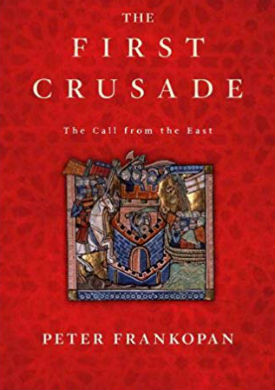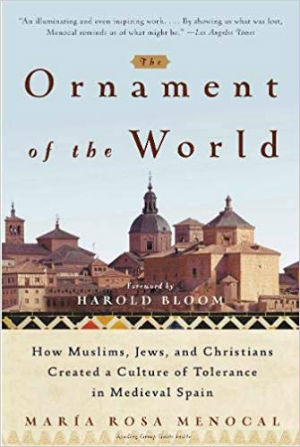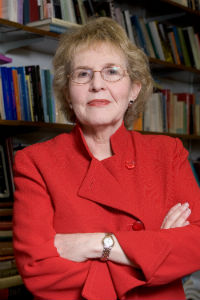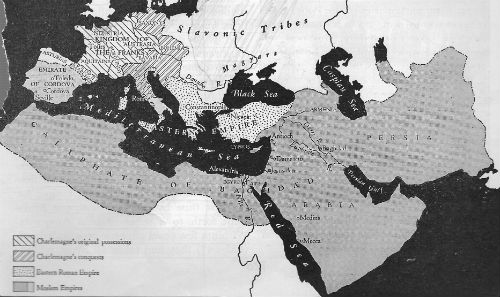So What About the Crusades?
By Neil Earle
Sometimes when a conversation about God and the Bible is going along smoothly someone interjects: “Yes, but what about the Crusades?”
Quick Crusade Quiz
Paul Copan and Matthew Flannagan in Did God Really Command Genocide? offer a quick quiz to add perspective to today’s popular beliefs about the Crusades. True or false?1. The Crusades were a morally unjustified military campaign against peaceable Muslims initiated by the church.
2. The Crusades were a land grab and an imperial adventure aimed at plundering Muslim lands.
3. The Crusades were a Roman Catholic effort to gain converts by force.
4. Muslims have stewed over and resented the Crusades since the Middle Ages.
5. The Crusades were inspired by anti-Canaanite texts in Deuteronomy and Joshua.
None of these beliefs are true but they have been an undercurrent in Western nations since the events of September 11, 2001 in the United States. Copan and Flannagan’s study show how neither the Crusades nor OT “command and destroy” texts are correctly echoed by extreme Islamic holy war teachers today.
It is presented more as a challenge than a question, the interrogator assuming that here is a final trump card against Christians and the Church. “Surely,” some think, “there is no justifying those six or seven blood-soaked expeditions to the Holy Land to kill Muslims. How could a just God approve such slaughter? Doesn’t this make the God of the Bible like Osama bin Laden?”
And so it goes.
What are the facts?
Christians must give answers to tough questions when the Faith is under assault. In in our day the arguments of the New Atheists are heard loud and clear and have seeped into our coffee shop conversations and the morning news.
First of all it is necessary to get the history straight since the Crusades were a major turning point in world affairs. Look at the short quiz in the box that you could take to see if the reality squares up with the hype.
The First Crusade in 1095 was provoked when the Eastern Christian Emperor in Constantinople (now Istanbul) appealed to the Western leaders for help. This culminated decades of military defeat against the seemingly unconquerable Seljuk Turks who were Muslims. Before the Crusades Islam was already the major power, it had actually held the upper hand in the Mediterranean for centuries (see map). Only a battle south of Paris in 732 had stopped Muslim armies from sweeping completely through Western Europe.
In 1095 the Greek Orthodox Church headquartered at strategic Constantinople seemed about to go under. In 1071 the Turks defeated and captured the Eastern emperor. In 1078 Nicaea just down the road fell to the Muslims. An even more fanatical Islamic regime arose in Cairo claiming jurisdiction over Jerusalem and the famed Church of the Holy Sepulcher. Muslims had typically, if intermittently, harassed Christian pilgrims going to the city of Jerusalem. (The still-enduring Dome of the Rock structure had been built back in 692 on the supposed site of Solomon’s temple as a rebuke and challenge both to the Jews and the Greek Christians.)
“In Antioch around 1068 (where the word “Christian” was coined – Acts 11:26)” writes a Jewish historian, “Greek [Christians] and Armenians were converted by force, torture being used to persuade the recalcitrant.” Now the East seemed about to be lost to the Faith. That “call from the East” was the major factor in the Pope’s request for European kings to band together and rescue the Greek Church at Constantinople.

“The Call from the East”
In 1144 the Muslims took the city of Edessa on the Turkish-Syrian border. Here had been one of the centers of missionary outreach to India and China by a branch of the church called Nestorians. This event triggered the Second Crusade. Then in 1187 the brutal Muslim conquest of Jerusalem launched that most famous expedition known as the Third Crusade featuring kings such as Richard the Lionhearted of England. These realities led Thomas Madden in the journal First Things to remind moderns that “the crusades were in every way a defensive war. They were the West’s belated response to the Muslim conquest of fully two-thirds of the Christian world…The Christian emperor in Constantinople faced with the loss of half of his empire, appealed for help to the rude but energetic Europeans. He got it.”
This adds context to the overtold tale noised abroad today of fanatical, greedy European princes lusting after territory in Palestine and carving out kingdoms for themselves. In the end a few were able to do that but only for a brief period. The fabled wealth of the East was a no-show. In fact, the costs involved for a knight to outfit himself, his horse, and his servants for the long journey to Palestine could easily match the cost of a new Masserati today.
Europe on the Defensive
Much unfortunate blood was spilled. Cruel atrocities marred the record of both sides with the added feature of anti-Semitic massacres in Europe injected – often over the protests and active interventions of churches and bishops. There was blame on all sides, is the point. Listen to Bernard Lewis, the leading European scholar of Islam:
“For almost a thousand years…Europe was under constant threat from Islam, in the early centuries it was a double threat – not only of invasion and conquest but also of conversion and assimilation. All but the easternmost provinces of the Islamic realm had been taken from Christian rulers, and the vast majority…had been Christian countries in which Christianity was older and more deeply rooted than in most of Europe. Their loss was sorely felt and heightened the fear that a similar fate was in store for Europe.”
It is hard to improve upon this analysis. As we see below, the Western world today is afflicted by a strange case of historical guilt where the past is concerned. It seems to some clamoring voices that our ancestors must bear the brunt of all the shame accrued during the Middle Age. A long period indeed not well-covered by quickie time-pressured news reports on television.
In fact, there was no Crusader program for converting Muslims en masse. The motive force was protecting Christian lands and Christian pilgrims.
Neither do the Crusades bear the blame for the rise of modern terrorism. Historian Rodney Stark refutes this: “Claims that Muslims have been harboring bitter resentment about the Crusades for a millennium are nonsense…Anti-crusader feelings did not become intense until after the founding of the state of Israel [in 1948].” Modern politicians from Egypt’s Nasser, Saddam Hussein and Osama bin Laden have used modern-day resentments against the West to back-project a long and exaggerated history of hatred stemming from 1095. Meanwhile scholars such as Rosa Menocal remind us of periods of relative peace and benefit between Islam and Christianity, such as Moslem Spain in the 1100s.
 The Ornament of the World by Rosa Maria Menocal – An interesting if slightly idealistic look at medieval coexistence.
The Ornament of the World by Rosa Maria Menocal – An interesting if slightly idealistic look at medieval coexistence.Beyond the Myths
Evangelical authors Copan and Flannagan remind us of the sobering fact that, overall, the Muslims won! Muslim warriors such as Saladin more than held their own. The Crusader expeditions were localized and intermittent, stretching out as late as the 1600s. Caliphs in Baghdad did not give them their undivided attention and Crusader conquests and mini-kingdoms eventually melted away.
Overeager, popular and easy answers can distort our view of history. This is horribly short-sighted since the Crusades are still a vital field of study and can teach modern-day Christians, Muslims and skeptics some important lessons about our world today. These include:
1. The Bible gives no blanket endorsement for Christians to engage in “holy war” against those they fear or hate. The Old Testament commands to exterminate and wipe out certain people groups were localized, specific, time-dated and not intended to be universal. In fact, most of these commands were not carried out for a variety of reasons (check our article index to see why). Exceptions there surely were. Gentiles did make peace with Israel and prospered, and two of them became ancestors of Jesus Christ – Rahab and Ruth.
2. While wars will always surprise its planners and go off in radical ways no one can foresee (e.g. the U.S. involvement in Iraq) a whole body of Christian teaching argues that it is permissible under certain circumstances for military forces to exercise the police powers denoted in Romans 13. Nations are permitted to draw the sword to put down overweening cases of injustice such as the Holocaust, the gassing of innocent children and when obnoxious regimes need removing such as Communist Vietnam’s crushing of Pol Pot’s reign of terror in Cambodia in the 1980s.
The Christian tradition of Just War goes back at least as far as Augustine in the 400s. Mainstream theologians have done some hard thinking across the centuries, putting forth reasonable perspectives on when nations can rightly draw the civil sword. These tenets include just cause, just authority responding, proportional response, the factors of last resort and concern for civilian casualties and with reasonable chances of fairly prompt success. Some see these principles at work in the First Gulf War of 1991, and even here there were specific charges of unnecessary and excessive retribution levied against the victors. At various times across history the Church has exercised its Christian conscience when wars to restore justice or civic order have turned into wars of revenge and retaliation or sheer power-grabbing. As British bishops did in World War Two protesting the indiscriminate bombing of Germany!
Was Jesus a Pacifist?
3. A related issue here is the example of Jesus. It is not easy to make Jesus out to be an absolute pacifist. He protested his illegal treatment by the hierarchy of his day (John 18:23). He certainly performed an act of angry judgment when he chased the moneychangers from the temple with a whip he had fashioned. (Jewish scholars call this Jesus’ “temple tantrum.”) The young rabbi who launched bold invective against the religious rulers of his nation in Matthew 23 was hardly an uninvolved bystander. Later, St. Paul taught Christians to respect the powers that be. “Fear God, honor the king,” said Peter. The police powers delegated to legitimate rulers by God to keep order for the public good pervades Romans 13. Neither the apostles nor John the Baptist required military personnel to abandon their profession. These are quick synopses of what are controversial issues and deserve further discussion. We must avoid, however, a peculiar cultural attitude we find in Western nations today.
 Jean Elshtain
Jean Elshtain4. Avoid “cheap guilt” and media manipulation. Jean Bethke Elshtain was a Lutheran-raised teacher of ethics. She addressed the concept of “cheap guilt” in her provocative book Just War Against Terror wherein she defended the right of the Western nations to defend themselves against terrorists committed to total annihilation. Cheap guilt is that strange attitude where we in the West can “feel good about feeling bad.” Her classic example is the way the crusades are viewed today. It is easy to deplore the actions of our ancestors and feel good about adopting a righteous posture centuries later (“chronological snobbery” as Christian writer C.S. Lewis has called it). This approach that feeds our own superior moral beliefs "on the cheap." Consider that we never know how we would have acted in 1095 or how the future will judge us for our own blind spots.
Dr. Elshtain quotes theologian David Yeago who made the point that by assuming all Muslims exhibit irrational feelings of revenge or are chained forever to their more volatile scriptures means we treat them as children unable to progress – a condescending attitude at best.
God of Love and Justice
Elshtain puts forth a claim that draws much criticism today. It is the fact that Christianity is not just solely a religion of love and peace. Jesus gave a comprehensive worldview that has a lot to say about justice and good order in the world (Matthew 26:55). “Behold the goodness and severity of God,” St. Paul advised. Christians are called to be light and salt in a very complex world. This being so we owe it to our calling to be well-informed, to think clearly and with wisdom before we engage the issues noised abroad today.
Listening to one-sided interpretations of the crusades or the conquistadores or the Inquisition militates against the shrewd advice of Jesus: “Do not judge according to the appearance but judge righteous judgment.” The issues coming at us as both Christians and secularists do indeed seem bewildering at times. In such cases we heed the ancient wisdom to dig hard for wisdom as if digging for gold. Then Christians can better embrace our calling to be “all things to all men” and giving a good witness for the beliefs we hold.
